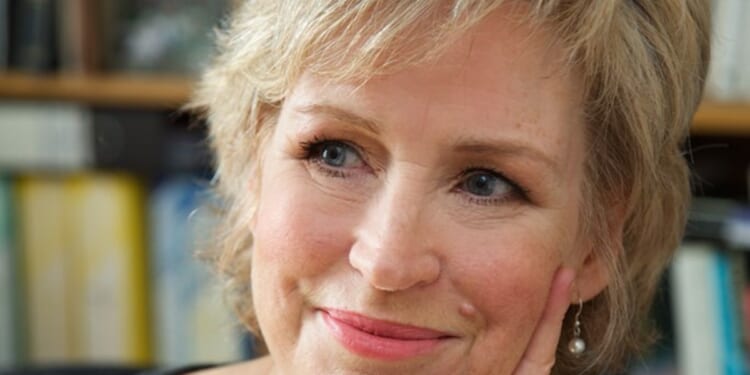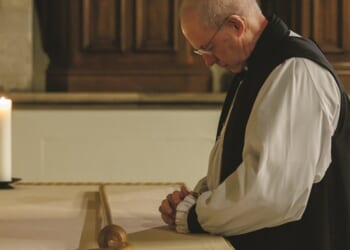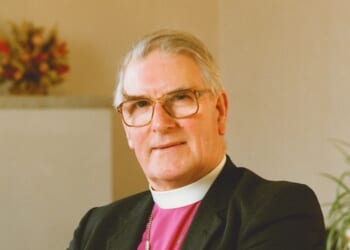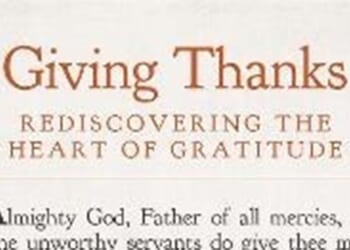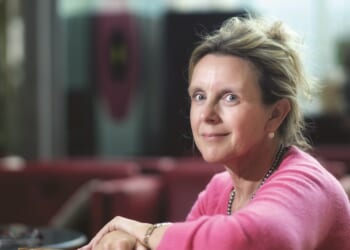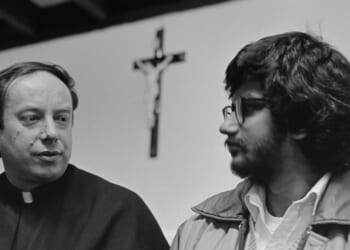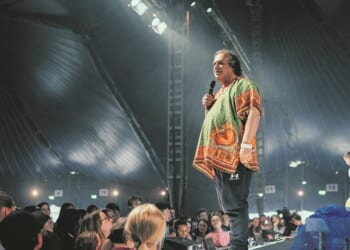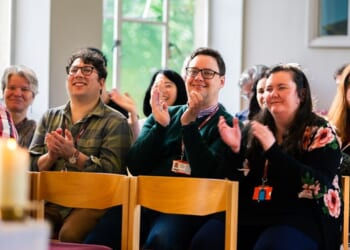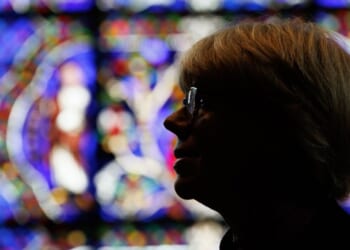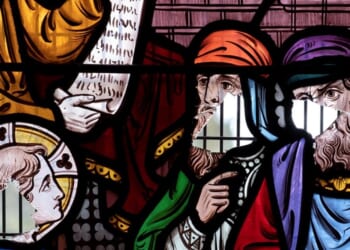SALLY MAGNUSSON has been a presence on British TV screens for 45 years, including more than 30 years as a presenter of Songs of Praise. In April, she bowed out of her long-term presenting post at Reporting Scotland after 27 years. Yet her career as a novelist shows no signs of slowing down.
Her fourth novel, The Shapeshifter’s Daughter, weaves Norse mythology, particularly the story of the goddess Hel, with the modern-day concerns of an Orcadian character, Helen, returning to her native island after a long time away.
For Ms Magnusson, immersion in Norse mythology sits side by side with Christian faith, and was influenced by her early family life and by her father, the Mastermind presenter Magnus Magnusson.
“I grew up with the Norse myths through my father, who was a scholar of Icelandic sagas and Norse myths, who translated the sagas and knew all the stories in the Norse myths, and told them very entertainingly; so it’s part of the furniture of my imagination,” she says.
“I find myths — not just the Norse ones — fascinating, because they are the stories we have told ourselves down through the generations, in different cultures. They tell us a lot about the human condition and what we’re afraid of, and what we hope for in our frailties and our cruelties.”
The character of Hel appealed to her, because she felt that Norse goddesses tend to get overshadowed by the more attention-grabbing Odin, king of the gods, Thor, the thunder god, and Loki, the trickster. “I thought, how interesting it would be to tell Hel’s story from the inside, which means imagining what it was like to be that young girl, with an old half of her face, in charge of the dead, and beginning to think, ‘Who am I really and why am I here? Do I need to be here?’”
Ms Magnusson also wanted to interrogate the negative spin put on Hel by the medieval compiler of the Icelandic Sagas, Snorri Sturluson. “Sturluson was writing for a medieval Christian audience. And he took the figure of Hel and moulded her into the Christian idea of what would happen to you if you went against the Christian Gospels, to end up burning in the fires of hell. These ideas got conflated, and Hel herself became responsible for everything.”
SHAPING new stories from mythic figures is a time-honoured tradition, she believes. “The whole point about myths is they have to keep being reinterpreted for your time. They’re not something static: they’re not stuck there like museum pieces. They are very fluid stories that reflect who we are and when we are.”
Reflecting the present day, an if-you-know-you-know hospital scene narrating a terminal diagnosis in the novel, demonstrates Ms Magnusson’s familiarity with contemporary institutions and their faltering responses to death. “We shy away from death as a society, understandably. Fiction can play its part in facing things, not morbidly, but finding out where the joy is in the inevitable decline into dying for all of us.”
The author has spoken of faith as something that is there at the darkest times, although she is modest about her ability to put this into words. “I’m not very eloquent or thought-through about faith.” But she continues: “Must people don’t get through life without some sort of tragedy or other. I’ve had people very close to me dying, and I know there are no glib answers to it. There was no point in convincing myself that it was all part of God’s plan, or that people were in a better place, or maybe not. I found that made my faith a much more restless thing than a calm acceptance.
“I find matters of faith difficult, knotty, messy. There’s a very human desire to smooth the edges of both human experience and religious or spiritual experience: to fit them into shapes that we can deal with, and say, ‘This is me, this is what I experience, and this is right,’ often in a proselytising way; and ‘I should tell other people because I’ve got this thing that is good and precious in my life.’ I’ve never found it as easy as that.”
Bringing to mind the death of her 12-year-old brother, Siggy, in 1973, three days after he was hit by a lorry, she continues: “The difficult times in life when I’ve had to wrestle with the loss of a brother, and parents, which we all do if we are fortunate enough to live long enough — we all lose our parents in the end, and none of that is easy, even if it is normal and natural.”
In her memoir, Where Memories Go (2014) (Books, 27 November 2015), Ms Magnusson documented her mother’s experience with dementia. She also started a charity, Playlist for Life, about promoting the use of personal music for people who have dementia, to aid their connection with themselves and with other people.
“If a faith is to be true to who you are, and what you experience, it has to meet you at the very bottom of things, where the questions lie. On balance, the faith that I carry today has met me in these places, and I am the richer for it.”
HAVING returned to live in Dunbartonshire, ten miles north of Glasgow, where she grew up, Ms Magnusson attends the church of her childhood, Baldernock Parish Church. “As a child, I went to a little country church, and in the circular way of life I’ve ended up back there. It was very simple services that ingrained it into who I am.”
Simplicity remains her spiritual preference over something more sacramentally elaborate. “It probably is a better fit for me, partly because I grew up with it, and what you grow up with is very much part of your being, even if you rebel against it. Also, because I’m a very wordy person, and words, and the hymns, and the very plainness of language — all these things speak to the ways I’m most comfortable.”
Ms Magnusson is a frequent worshipper at the church, built in 1795 on a site with a Christian history going back to the 13th century. At the entrance to Baldernock churchyard, a small octagonal watchhouse, built in about 1828, is a reminder of the era of grave-robbers, when church elders had to protect bodies from being stolen and sold to the School of Anatomy in Glasgow.
“I still go to Sunday worship in the little kirk. I go every Sunday if I can. It’s a very old church, and a very small church, and it’s one we have to protect, because churches are closing all over the place right now. We’re determined to keep this one open, and to keep a Christian presence where there’s been one for hundreds and hundreds of years.”
Describing the ethos of the Church of Scotland, Ms Magnusson explains: “It’s based on an understanding of church life that puts the congregation at the heart of everything rather than the bishop.” And this is reflected in her own outlook: “But the Church in my way of thinking is about the individuals, and what they are doing on every level.” Summing up her church family, she says simply: “They’re a very active lot.”
Encounters with a variety of religious traditions through presenting Songs of Praise have also been enriching. “Through my work on Songs of Praise over the years, I was exposed to all sorts of forms of worship. I always loved seeing what was different and what was the same. The deepest things were the same, and were in common, as the King found when he prayed with the Pope. What is core to all the different churches and denominations is precious and is shared by everybody.”
Highlights of her Songs of Praise years include a trip to the United States, where “they took me to Detroit and the most wonderful Black American choirs there. It was such a privilege.”
Synergies between childhood church experiences made meeting the Welsh baritone Bryn Terfel for the programme particularly resonant. “It’s never places that stand out for me: it’s always people. We did a marvellous programme with Bryn Terfel, who was taking me around the Welsh chapel where his religious experience and cultural heritage had grown. And I felt very at home there, because it was a small chapel, and plain décor, and just the most gorgeous Welsh singing.”
More ornate places of worship also left an impression: “I also loved the history of these places. We went to a wonderful cathedral with plaster-cast saints, and I love all that because I love getting into the histories of the people there.”
Reflecting on her journey of faith, Ms Magnusson’s gives a response that is the opposite of the contestants on her father’s famous TV quiz show. She says, simply: “I’ve no pat answers.”
Sally Magnusson will be speaking at an event at the Caledonian Club for the St Andrew’s Book Festival in London, 26-30 November.
The Shapeshifter’s Daughter is published by John Murray at £16.99 (Church Times Bookshop £15.29); 978-1-3998-2520-7.

